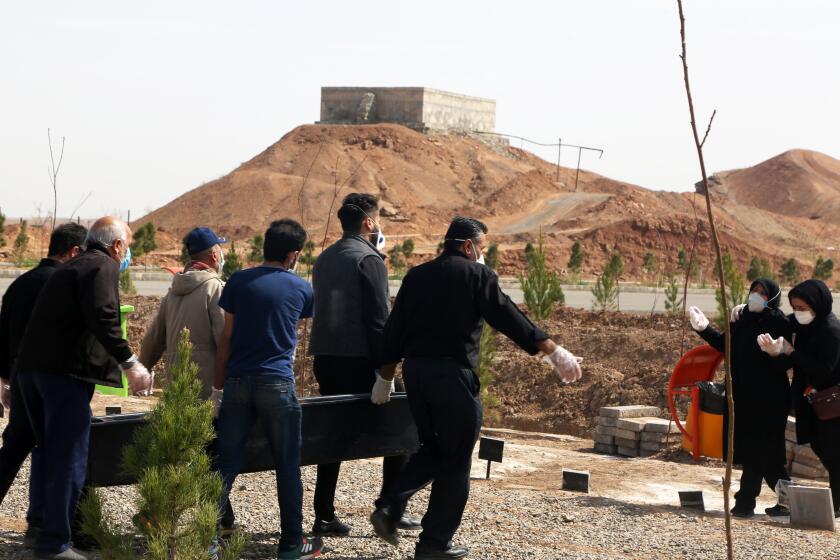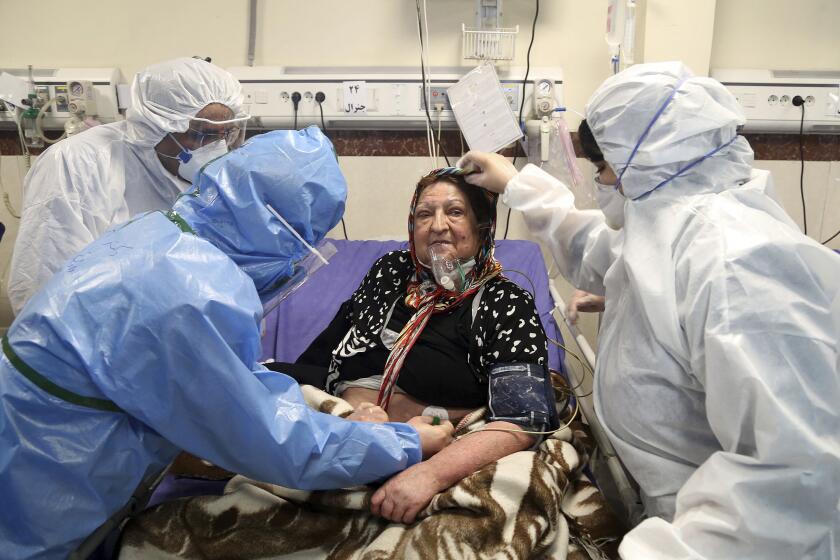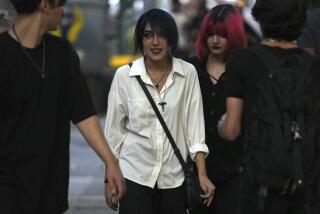They are the body washers, the women helping Iran through coronavirus
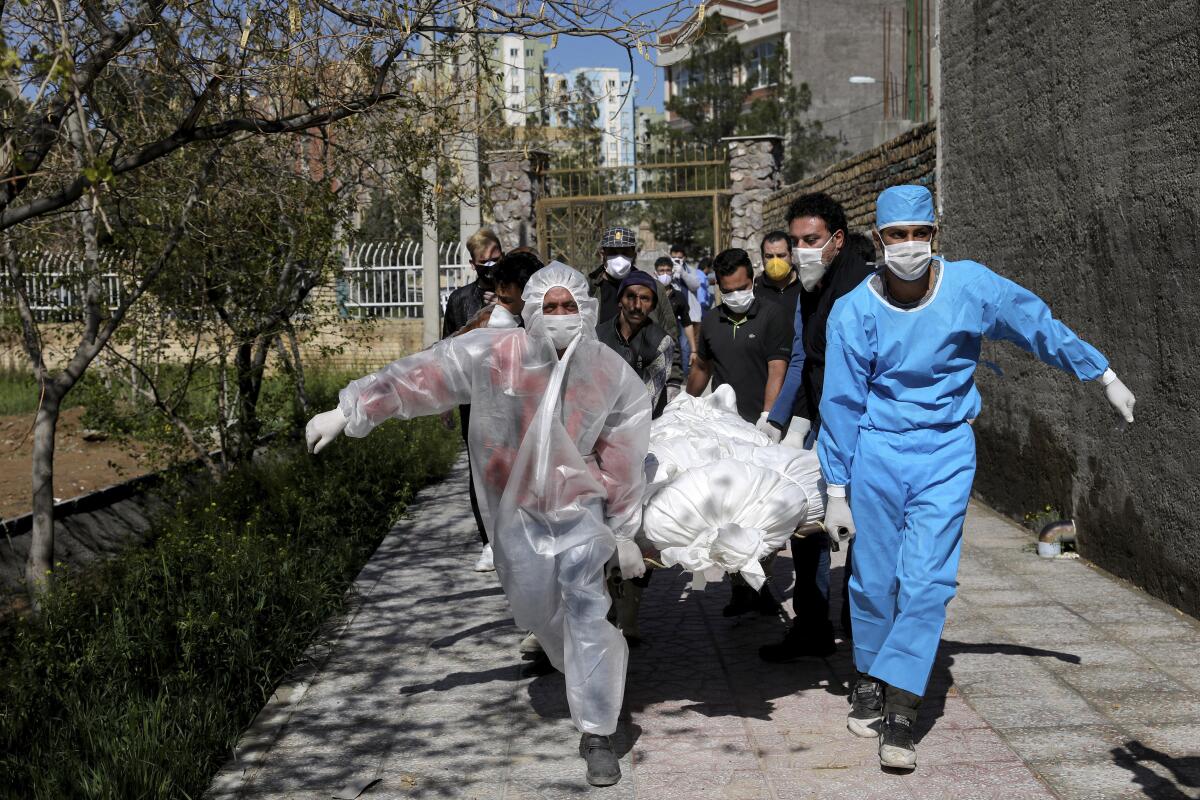
- Share via
The phone rang in the prayer room at the hospital. Another patient had died. A young woman left the room to rush to intensive care. She entered wearing a mask, gloves and scrubs. She was there for a sacred ritual that was centuries old but one that, like so much else around her, had been altered by the coronavirus.
The body lay on a bed on that late March day when Tahereh Adibi veered from Muslim custom. She didn’t wash the corpse with soap and water. Concerns about the dangers of touching meant she performed a different cleansing act. Placing a small marble slab beneath the deceased woman’s hands, she recited a prayer. She anointed the forehead with oil. Minutes passed. And then the body was taken to the morgue.
“It is not possible that a man sees and touches a woman’s corpse,” Adibi said, “so we do this in order to make sure Islam is observed.”
Adibi used to teach French at a cultural and educational institute. But the 33-year-old has become a volunteer body washer at a hospital in the south of Tehran. As the number of patients dying of COVID-19-related complications rises in Iran, one of the worst-hit countries in the world, authorities have called upon people to help uphold the Islamic custom of purifying the dead before burial.
Hers is a solitary ritual, a quiet, fleeting space between this life and the one after. She stands before God, over a person she never knew. But, somehow, she mourns each as if she had known them all her life. It’s not easy to bear witness, to do Earth’s final toil with gloved hands in a room where many succumb. But the need is great.
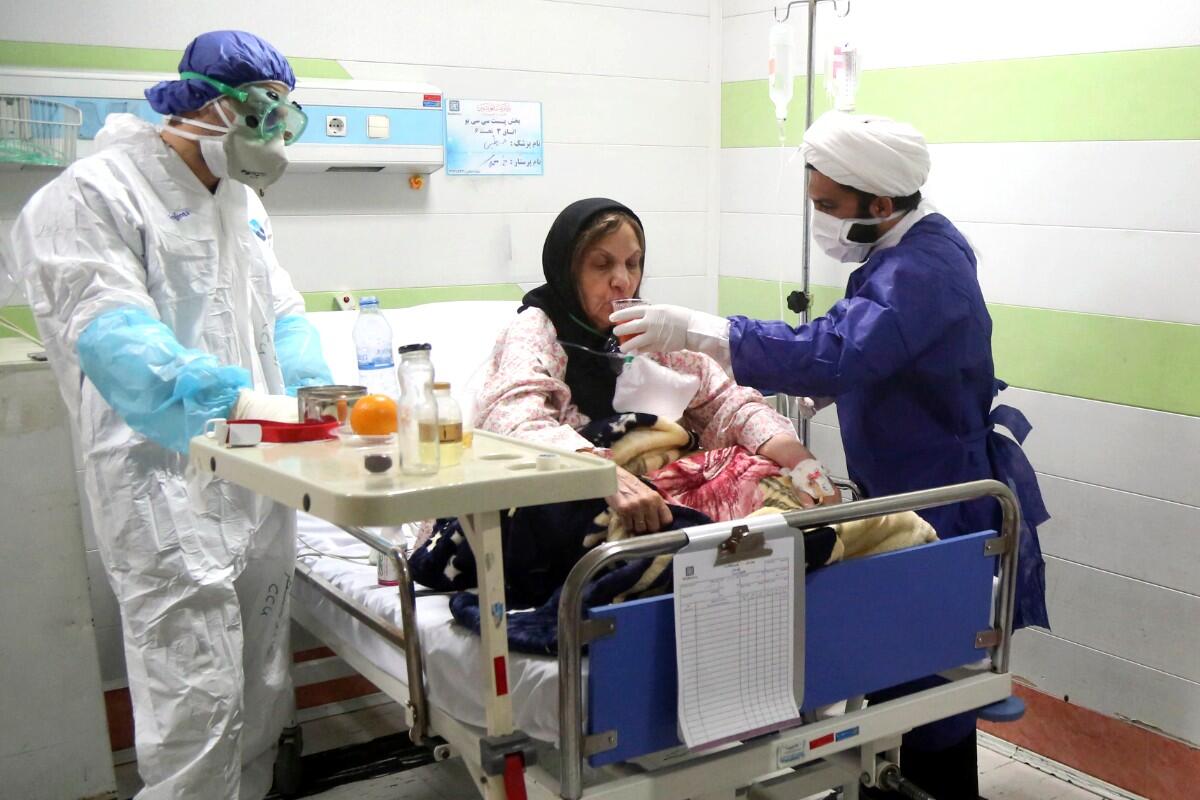
The phone in the hospital’s prayer room never seems to stop ringing. It’s a toll for another mom, sister, aunt or grandmother taken by the virus. Sometimes, when she cleanses the dead, Adibi’s mask makes it difficult to breathe; sweat fogs up her glasses, blocking her vision.
It was shortly after the Persian New Year when Adibi asked a few friends on WhatsApp if they knew of any groups that were helping wash the bodies of coronavirus patients. A friend gave her a number for a group of 50 volunteers at Firouzgar hospital in the south of Tehran.
The coronavirus has brought mass graves, devastated families and a change to Islamic burial rituals in Iran. The pandemic is changing how Iranians live and die.
Others across Tehran were stepping up to help out in other ways as well, including Maryam Moghadam, a university professor, and her friend Narges, a fashion designer. For the last several weeks, the women have been part of a team of volunteers who dress in gray hazmat suits and spray disinfectant on the streets, subway stops and shelters of Tehran.
Many just want to do something as the country’s death toll keeps rising. Iran is the epicenter of the coronavirus outbreak in the Middle East. Authorities announced 1,606 new cases Thursday, bringing the nation’s total number of infections to 77,995. The deaths have risen to more than 4,860, though some officials believe the actual number may be much higher.

For the last 15 days, volunteers Maryam Moghadam, a university professor, and her friend Narges Mohammadi, a fashion designer, have been donning uncomfortable hazmat suits and spraying disinfectant from heavy bags in Tehran. For four hours each day, the two spray sidewalks, bus stations, subway stops, shelters and nursing homes. It’s not easy work.
Adibi knew caring for the dead was her chance to help. She understood the risk of catching the virus while working in a hospital filled with COVID-19 patients was high. She also wondered what her friends would think of her. But she felt her concerns were minor when compared to the religious call to duty.
Her parents pleaded with her to change her mind. But there was no talking her out of it. Eventually they came around.
“My darling, go if you think you need to go,” Adibi recalled her mother telling her.
Since the virus arrived in February, Iran’s leaders have been blamed for the staggering loss of life as well as for their response, actions that have included stopping an international nonprofit team of doctors from treating coronavirus patients, spreading conspiracy theories that blame the U.S. government for the outbreak, and failing to restrict people’s movement and close religious sites.
The country’s efforts to fight the outbreak have also been hampered by rising inflation, combined with a shortage of foreign currency and U.S.-imposed sanctions. Meanwhile, Iran’s conservative Shiite clerics have been struggling to uphold sacred Islamic rituals while also implementing measures that help curb the spread of the pathogen.
In March, when Adibi started volunteering, clerics had outlawed washing the dead with water, a practice known as ghusl, for fear of contamination. Small marble slabs were placed on the corpse instead. But when Supreme Leader Ayatollah Ali Khamenei declared in April that the dead should still be washed with water, Iran’s Health Ministry and its national headquarters for fighting the coronavirus bowed to pressure from hard-liners and reversed course despite concerns that it might lead to a second wave of COVID-19 cases.
Adibi was elated with the ruling.
“I screamed and clapped,” she said. “I’ve been eager to start using water again.”
Others criticized the Islamic Republic’s handling of the crisis and viewed the regime’s response as yet another example of why it lacks widespread legitimacy.
In a letter written in March to President Hassan Rouhani, Iranian health minister Saeed Namaki protested the administration’s decision to start allowing people to resume going to work and said that failure to follow medical experts’ advice would “ignite the coronavirus and will damage the country’s health system and subsequently the economy.”
“The slightest reckless and unprofessional move will result in irreparable damage,” Namaki wrote in his letter to Rouhani.
But for the country’s pious Muslims, such as Adibi, maintaining Islamic customs is a matter that goes beyond politics and restrictions.
Back in the hospital in late March, Adibi entered the room. Lying on the hospital bed was the corpse of an old woman. Adibi drew the curtains; even in these times the sanctity of the deceased must be preserved. She took a minute to make sure patients in adjoining rooms did not see her. She didn’t want to diminish their morale.
She didn’t know much about the woman who had died. She picked up a medical chart, looked inside and found the name.
“How beautiful you look,” Adibi said.
She asked a nurse for a rubber band and used it to tie back the woman’s hair.
When she was certain she was alone, Adibi began.
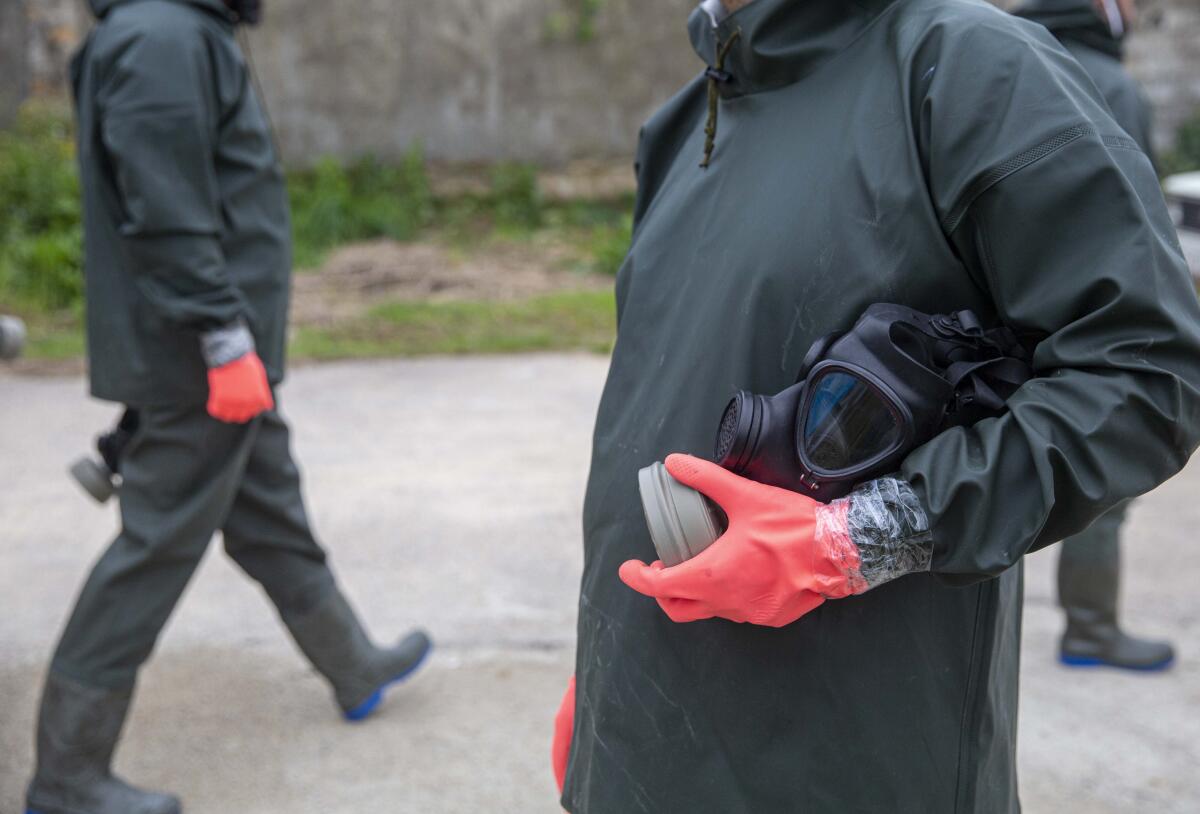
She said a prayer and placed the dead woman’s hands on a rectangular slab of marble. The body was still warm. Adibi held the arms, joined the hands together and lifted them to the forehead. After, she placed the arms on the sides of the body again. The marble rested on the abdomen. She raised the corpse’s left hand and rubbed it across the right hand. She repeated this using the right hand.
She did this process, known as tayammum, three times.
After, Adibi put camphor oil in a glass of water and rubbed the mixture on the corpse’s forehead, palms, knees, foot and fingertips. She prayed out loud.
This process, known as hanut, can be difficult to learn.
“The first time, I got confused and forgot,” Adibi said, “so I had to repeat it from the beginning.”
In the battle for regional influence, coronavirus worries make Middle East countries vulnerable to disinformation campaigns.
When Adibi was finished, she covered the body in a linen shroud and wrapped it in plastic. Her work was done. But she wanted to do more.
She remembered the advice she received from a fellow volunteer when she first started: “God has comforted their hearts so that they do not abandon their religious duties.”
So, she waited with the dead body.
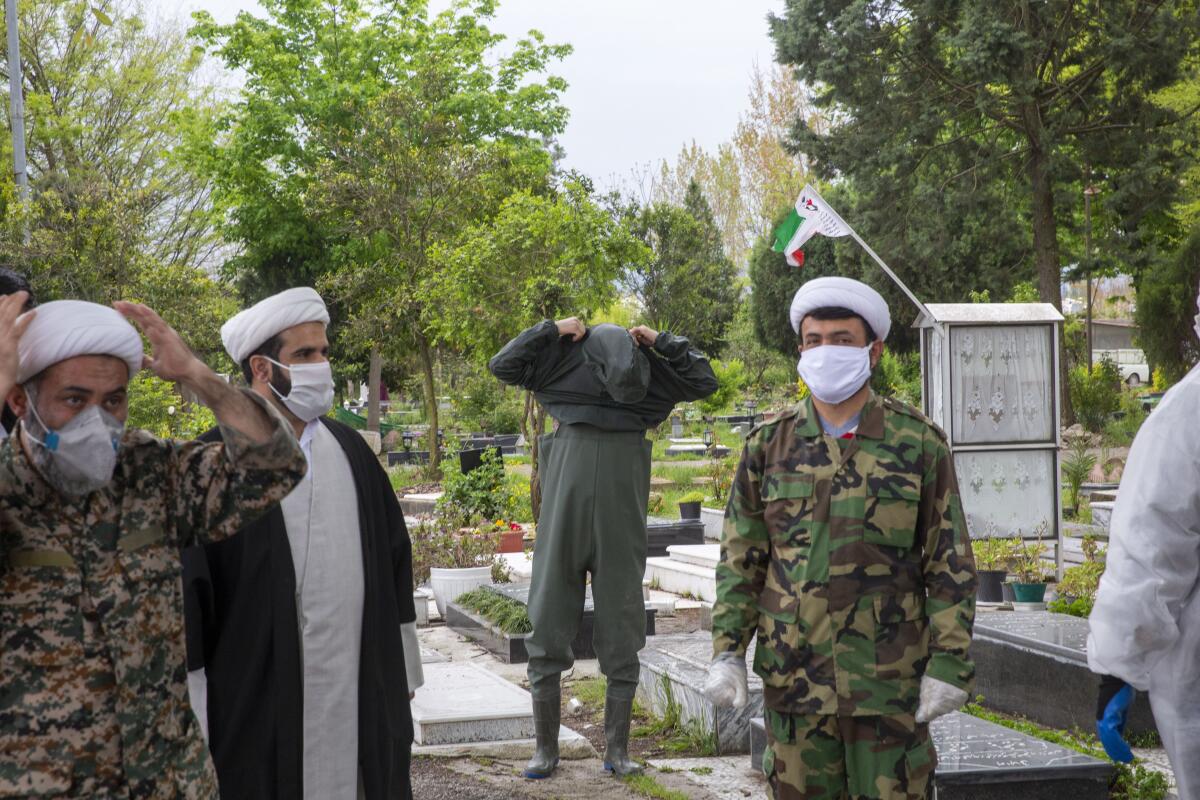
A few people entered the hospital room. They wrote the woman’s name and cause of death on the plastic sheet that covered the body. They whisked the body away to the morgue, where it would await burial.
Adibi said she felt as though the woman’s soul had become part of her.
“The most difficult part,” she said, “is to see someone in the ward before they die, only to be summoned to the ICU the next day.”
By the end of the week, she had already bonded with COVID-19 patients and medical staff. Some days she brought flowers. Other days, she sat with patients and encouraged them to eat. She didn’t mind how doctors and nurses had come to refer to her and the other volunteers as “Azrael helpers,” or the helpers of the Angel of Death.
But the phone in the prayer room still rings.
A special correspondent in Tehran contributed to this report.
More to Read
Sign up for Essential California
The most important California stories and recommendations in your inbox every morning.
You may occasionally receive promotional content from the Los Angeles Times.
